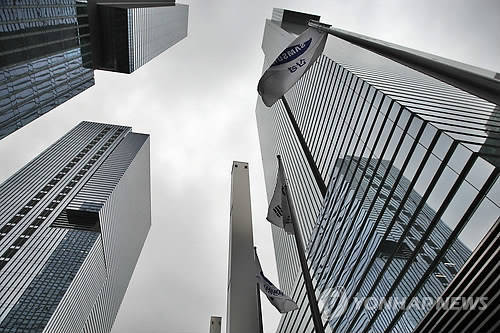Following is the second in a four-part series featuring the battle between Samsung C&T and Elliott Associates over the Korean builder’s merger with Cheil Industries and its implications. -- Ed.
Samsung Group, Korea’s top conglomerate seeking a controversial merger between its two key units, is setting a final showdown with U.S. activist investor fund Elliott Associates opposing the high-profile deal at the coming shareholder vote.
In May, Samsung C&T, the group’s construction and trading unit, announced a plan to merge with Cheil Industries, the conglomerate’s de facto holding company.
Since then, the hedge fund, which is the third-largest stakeholder in C&T, has widened the frontline of its battle to stop Samsung’s $8 billion merger deal.
Samsung Group, Korea’s top conglomerate seeking a controversial merger between its two key units, is setting a final showdown with U.S. activist investor fund Elliott Associates opposing the high-profile deal at the coming shareholder vote.
In May, Samsung C&T, the group’s construction and trading unit, announced a plan to merge with Cheil Industries, the conglomerate’s de facto holding company.
Since then, the hedge fund, which is the third-largest stakeholder in C&T, has widened the frontline of its battle to stop Samsung’s $8 billion merger deal.

With no clear majority shareholders, attention is being paid to the role of the company’s largest investor of the state-run National Pension Service at the July 17 crucial vote. The NPS has yet to state whether it will emerge as a savior or a spoiler.
The business community is also closely watching the Samsung-Elliott faceoff with an apparently painful memory of foreign hedge funds’ tactful attack of Korea’s unprepared conglomerates with weak governance.
It is the second foreign hedge fund to challenge Samsung C&T. The Korean builder suffered a hostile takeover attempt by U.K.-based Hermes Investment Management in 2004. The fund bought a 5 percent stake in the company and raised the possibility that it could support a hostile takeover attempt by other foreign investors. Soon after, the fund sold its entire stake for a profit that Korean media estimated at 38 billion won ($33.4 million).
Some other major companies in Korea were also targets from foreign hedge funds armed with capital and expertise in legal battles. In most cases, foreign hedge funds took issue with management-related problems to boost stock prices as controlling families and would-be reformers competed for control of the company. They then sold them after reaping gains, branded a “dine and dash” tactic.
Their targets were mainly family-controlled conglomerates whose controlling families own smaller stakes than those held by foreign investors.
About a decade ago, Sovereign Asset Management, a major foreign shareholder of SK Corp., enjoyed about 1 trillion won in capital gains only 1 1/2 years after investing in SK Group’s de facto holding company.
According to the main bourse operator Korea Exchange, the capital gains earned by the Monaco-based investment fund on the deal came to 964.8 billion won ($861 million).
Sovereign purchased an 8.64 percent stake in SK Corp. on April 3, 2003, and made public in its regulatory filing that it bought additional stocks of the company to raise its holding to 14.99 percent on April 16.
Sovereign reportedly tried to gain influence over the management of SK Corp. right after the accounting irregularities at SK Networks in 2003 by calling for greater transparency and an improved corporate governance system.
At that time, some analysts said the fund acted as if it was in the vanguard of the SK Group reform scheme, but really only intended to rake in huge capital gains from its activities.
In a bid to eliminate doubts about the fun’s intentions, Sovereign has described itself as a long-term investor, adding that its average investment horizon surpasses four years under normal circumstances.
Another case was billionaire investor Carl Icahn’s 2006 attempt to take over toward the nation’s top tobacco- and ginseng-maker KT&G, joining hands with other foreign hedge funds. Icahn and his allies bought a 6.59 percent stake in the company and demanded seats on its board. The tobacco-maker protected its management rights with the support of the National Pension Service. But the foreign investor sold all the shares and pocketed a net profit of 150 billion won.
Samsung C&T also desperately needs the support of the National Pension Service to pass its merger proposal through the shareholder meeting as the state-run pension fund operator is the largest stakeholder in C&T with 11.61 percent.
Many stock analysts as well as financial regulatory officials share the view that Korean companies have offered huge investment gains since the country opened its capital markets to foreign investors in the late 1990s.
Some analysts said foreign investors’ stock purchase of Korean companies and their demand for improvement in their corporate governance would help the nation’s economy in the long run.
But Koreans’ overall stance toward foreign hedge funds’ activities in Korean stock markets is negative, as most of them have sought to make short-term profits before pulling their money out of the country, a stock market observer said.
There are also growing calls that the nations’ conglomerates should reform their governance systems and pursue shareholder-friendly policies, including higher dividend payouts.
By Kim Yon-se (kys@heraldcorp.com)


![[Exclusive] Korean military set to ban iPhones over 'security' concerns](http://res.heraldm.com/phpwas/restmb_idxmake.php?idx=644&simg=/content/image/2024/04/23/20240423050599_0.jpg&u=20240423183955)
![[AtoZ into Korean mind] Humor in Korea: Navigating the line between what's funny and not](http://res.heraldm.com/phpwas/restmb_idxmake.php?idx=644&simg=/content/image/2024/04/22/20240422050642_0.jpg&u=)




![[Graphic News] 77% of young Koreans still financially dependent](http://res.heraldm.com/phpwas/restmb_idxmake.php?idx=644&simg=/content/image/2024/04/22/20240422050762_0.gif&u=)
![[Herald Interview] Why Toss invited hackers to penetrate its system](http://res.heraldm.com/phpwas/restmb_idxmake.php?idx=644&simg=/content/image/2024/04/22/20240422050569_0.jpg&u=20240422150649)




![[Exclusive] Korean military to ban iPhones over security issues](http://res.heraldm.com/phpwas/restmb_idxmake.php?idx=652&simg=/content/image/2024/04/23/20240423050599_0.jpg&u=20240423183955)



![[Today’s K-pop] Ateez confirms US tour details](http://res.heraldm.com/phpwas/restmb_idxmake.php?idx=642&simg=/content/image/2024/04/23/20240423050700_0.jpg&u=)